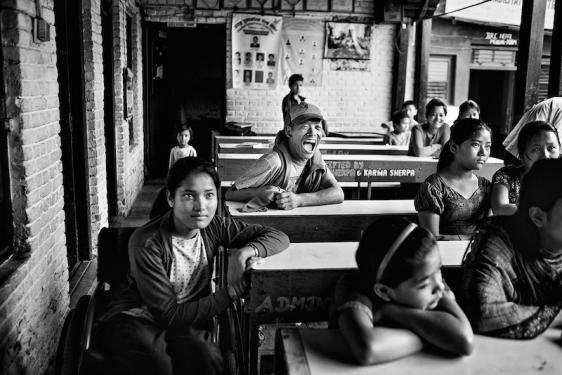
Monthly Newsletter | Issue 18 - February 2022

Reference Group on Inclusion of Persons with Disabilities in Humanitarian Action
Welcome to the 18th edition of the DRG Newsletter!
Many of us have been busy during the past month preparing for and participating in the Global Disability Summit (GDS), and we are glad to announce that
174 Commitments were made under the theme "Situations of Crisis and Conflict". In this edition of our newsletter we’ve included some links to the recordings of the numerous humanitarian-focused events that many of us contributed to at the Summit. This was an important opportunity for governments, UN entities, and civil society to make commitments for promoting the rights of persons with disabilities affected by humanitarian emergencies. We must now ensure that we work together to maintain the momentum generated through the GDS and use the power of our collaboration to support the realization of the commitments made.In this newsletter, in addition to sharing information about the GDS, we are also sharing some interesting new reports and guidance documents. As always, we hope you find this useful, and encourage you to share with us any updates you would like to see included in our next newsletter!
Elham Youssefian (International Disability Alliance), Christian Modino Hok (CBM Global) and Kirstin Lange (UNICEF)
© Christian Tasso
Global Disability Summit - Feb 16th & 17th
-->
GPC Commitments and Recommendations Ahead of the Global Disability Summit
Persons with disabilities experiencing humanitarian crisis are at elevated risk of rights violations due to attitudinal, institutional, physical and communication barriers to safety and life-saving services during times of socio-economic breakdown and suspended or dismantled services. In 2022, over 41 million persons with disabilities are expected to need humanitarian assistance.
Ahead of the Global Disability Summit (GDS) that took place on 16-17 February 2022, the Global Protection Cluster (GPC) published its commitments and recommendations for humanitarian partners.
-->
DRG GDS Side Event on Promoting the Rights of Persons with Disabilities Affected by Humanitarian Emergencies
The DRG organized a side event on promoting the rights of persons with disabilities affected by humanitarian emergencies, to complement the call to action launched in the lead-up to the Summit.
The recording of the event is now available.
-->
Call for Action to Ensure Protection and Safety of Persons with Disabilities in Ukraine - EDF
-->
Report on Lessons Learned from Partnerships with Organisations of Persons with Disabilities - CBM Global
-->
Call for Expression of Interest: Consultations with Special Rapporteur on Situation of Persons with Disabilities During Armed Conflict
UN Special Rapporteur on Rights of Persons with Disabilities, Professor Gerard Quinn, is conducting their next thematic study on the situation of persons with disabilities during armed conflict.
If you are a person with disability, family member or disability rights advocate with first-hand experience and information on situation of persons with disabilities during conflict, you can express your interest to participate in consultations by filling the form below no later than Thursday, March 17th.
Please note that while the survey is only in English, interpretation in French, Arabic and Spanish and international sign will be provided in consultations. Consultations will be organized at regional levels and online, with support by the United Nations Office of High Commissioner for Human Rights, International Disability Alliance, International Committee of the Red Cross, and Human Rights Watch.
-->
Report on Abuses Against Children with Disabilities in Armed Conflict around the world - Human Rights Watch
Children with disabilities often face an increased risk of harm during armed conflict and crises. Since 2015, Human Rights Watch has documented the impact of armed conflict and crises on children with disabilities in Afghanistan, Cameroon, the Central African Republic, the Gaza Strip in the Occupied Palestinian Territory, South Sudan, Syria, and Yemen. This report summarizes presents these findings to highlight the actions needed to protect and include children with disabilities in situations of armed conflict.
-->
IASC Guidelines on Humanitarian Action in Swahili
-->
Launch of the Inclusive Education Resources and Toolkit - Save the Children
Save the Children Italy and Save the Children Sweden are pleased to invite you to the global launch of the Inclusive Education Resources and Toolkit on Tuesday 1st March, 9:00 EST / 14:00 GMT (UTC).
They have pulled together a brand-new Toolkit with the most relevant resources and tools existing from Save the Children and Others proposing concrete education solutions for all children.
This webinar will be held via Zoom. International Sign Interpretation and live subtitles will be available throughout the event. The session will be recorded for those who will not be able to join and will be made available through SC channels.
>> Link to Register to the Event
>> Link to the Inclusive Education Resources & Toolkit
-->
>> Link to the Study
>> Link to the Executive Summary of the Study
>> Link to Other Accessible Formats of the Study
-->
-->
Zero Project Conference on Accessibility
-->
Launch of the Photovoice Study on the Barriers and Enablers to the Social, Economic, and Political Inclusion of Women with Disabilities in Nepal
The launch will take place on the occasion of International Women’s Day and within the context of the CRPD session and review of Switzerland in Geneva. Due to Covid 19 restrictions, it is possible that the event will take place online.
- When: March 8th 2022 from 2:00 p.m. to 2:45 p.m.
- Where: Palais des Nations, Geneva (or online)
- Accessibility is guaranteed
